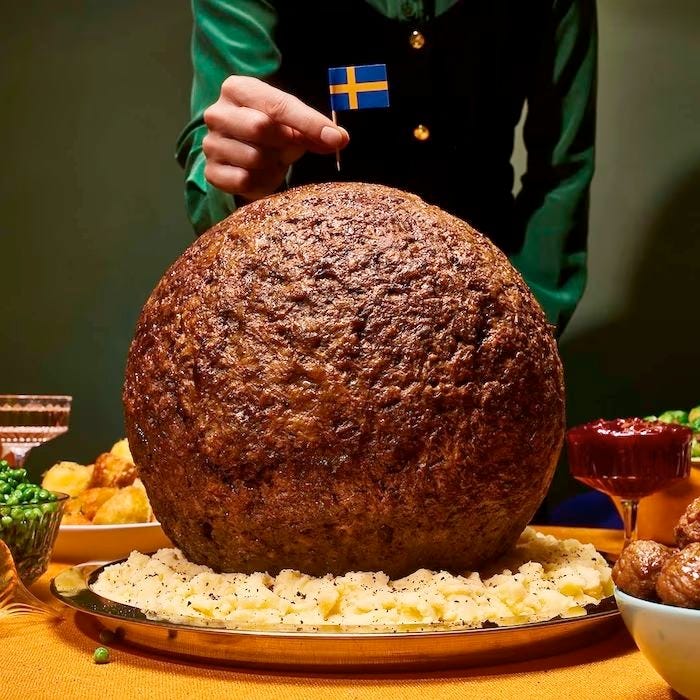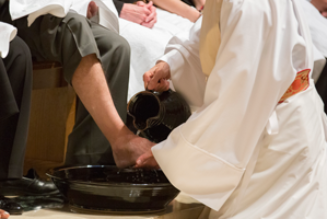Happy Friday friends,
This newsletter is coming to you from somewhere over Missouri. I’m on my way to Denver this morning.
It’s coming up to the end of the year, so JD and I have to be in the same place at the same time to sign some things at the bank, check our maths on the end-of-year numbers before turning them over shamefacedly to our accountant, and basically have our annual conversation about The Pillar’s financial viability heading into the New Year.
Assuming we haven’t made a catastrophic mistake, I’m quietly confident The Pillar will still be standing in 2024. That’s cause to rejoice all on its own.
Though, if I am being honest, things are still some way off from being as rosy as a Gaudete Sunday chasuble.
It’s no secret we want The Pillar to grow, and for us to be able to do more.
We want to grow our news team, so we can keep eyes and ears on more corners of the life of the Church — and so the rest of us can, one day, maybe, scale back to something like a 10-hour working day.
We have at least two really, really, promising ideas for new podcasts to launch. And JD and I have some big ideas for international trips we want to do next year, touring the countries and dioceses of the newly minted cardinals from what we’re now calling the “peripheries.”
Of course, all this costs money. And for us that really only comes from one place: you, reading this newsletter, choosing to become a paying subscriber.
We don’t have a paywall, and we don’t want one. Some of our readers, including priests, religious sisters, missionaries, and families in real tough times, really can’t afford a few dollars a month and we would never want to lock them out.
We do have an honesty box, though. We trust that the people who read our work every day, and get these newsletters every week, will do the right thing and help pay for the news they’re reading if they can.
It’s not a perfect system, I know.
For example, we’ve got several dozen journalists from the New York Times, Washington Post, Wall Street Journal, National Catholic Reporter, and EWTN who, we can see, receive and avidly devour these newsletters every week, but who apparently don’t think journalism worth reading is journalism worth paying for.
I’ve given up on hoping they’ll do the right thing, though I imagine their corporate expense accounts could stretch to the buck and change a week we ask for.
But we do count on you to understand that we’re doing things differently here, and to help us keep doing it, and to do more of it, better.
That The Pillar exists at all, and is producing work that other journalists apparently know they need to read, is thanks to our paying subscribers, no one else. So thank you for that. I mean it.
In a 2014 homily for Gaudete Sunday, Pope Francis said that it “hurts to see Christians with a bitter face.” And, sincerely, I have nothing to be bitter about.
God has blessed me, and The Pillar, in ways I would never have imagined when we started this thing just under three years ago. I have him, and you, to thank for that, and to rejoice about.
Here’s the news.
The News
Fr. Alberto Beretta, a Capuchin priest and the brother of St. Gianna Beretta Molla, was declared “venerable” on Thursday, as Pope Francis formally recognized his life of heroic virtue.
But we all know some Capuchins, right? So what makes Beretta’s life heroic and venerable?
—
Poland’s new education minister has called for a reduction in state-funded religion classes in the country’s schools following the recent elections.
Religion classes were introduced in Polish schools in 1991, following the collapse of communism. Catholic catechism classes in schools are governed by principles set out in the 1993 concordat between Poland and the Holy See.
So what are the bishops saying? And what happens next?
—
Pope Francis gave a TV interview this week in which he discussed his wishes for his funeral and burial.
While it’s obviously not normal for a pope to be buried outside St. Peter’s, it’s not unheard of either, and Francis won’t be the first permanent resident of St. Mary’s.
So who else is buried in Francis’ (eventual) tomb?
—
Pope Francis also confirmed he’s planning a trip to Belgium for the new year.
While it’s debatable if that nation qualifies as being on the “peripheries” of Europe (I think it does, even if it does host the EU capital), there’s no question there are potential pitfalls for a papal visit.
You can read what to expect for the trip, and what to watch out for, here.
—
Tomorrow is decision day in the Vatican financial trial. This is my World Cup final, or it would be if the World Cup only happened every 40 years or so.
Obviously, a lot hangs on the verdict when it comes to assessing the resilience of the Vatican’s judiciary and exactly how accountable senior Pillar readers are in Church financial matters.
But looking past the court case, how bedded in are the waves of legal and institutional reform created by Pope Francis?
You can read my whole analysis here.
—
The Dicastery for the Doctrine of the Faith this week published a formal responsa to some questions it has received on Church teaching and cremation.
The questions came from Cardinal Zuppi, president of the Italian bishops’ conference, and related to what, exactly, the Church allows and requires in the handling and preservation of cremated remains.
So what, if anything, has changed?
Love the mothers
Cardinal Víctor Manuel Fernández of the Dicastery for the Doctrine of the Faith (DDF) released a second letter yesterday, in response to “expressions of concern,” from a bishop in the Dominican Republic, about single mothers who “abstain from communion out of fear of the rigorism of the clergy and community leaders.”
The substance of the cardinal’s letter was to emphasize that, of course, women who, in this situation, have chosen life and who lead a very complex existence because of this choice, should be encouraged to have access to the healing and consoling power of the sacraments.
It’s something I, like most people, wish didn’t have to be said. But it sadly, tragically, does.
I was surprised, though, by many of the reactions I saw and heard playing the letter off as mostly relevant to parish life in other countries, with the implication — sometimes the overt assertion — that no one could really be confused about these things in, say, America.
Again, I wish it were not so.
I’ve myself received at least three phone calls in the last year from people asking canonical advice on just this issue — and that’s about average for me.
Sometimes, most painfully, it’s the mother herself who’s doing the asking, either because of something she’s assumed for herself, or been told by someone else — not usually by a priest, though it happens — that’s made her think the fact of her single motherhood has made her forever unworthy to receive at Mass.
For a start, as the DDF notes, there are cases and there are cases. In some situations, sure, a child arrives because of some extra-marital relationship. But the notion that this imparts some kind of permanent scarlet letter is appalling, especially when, as Pope Francis notes, they have given a witness of love and to life in embracing their motherhood with all its complications.
“You are a brave woman because you were able to bring these two daughters into the world,” Francis told one in a video conference with American Catholics organized by ABC in 2015.
“You could have killed them in your womb, yet you respected life: you respected the life you had inside you, and God will reward you for that, and he does reward you. Do not be ashamed; walk with your head held high: ‘I did not kill my daughters; I brought them into the world.’ I congratulate you; I congratulate you, and may God bless you.”
Shame is a powerful force, and often one which needs to be fought against, even and especially when the mercy of God has long since healed what was injured.
It’s also often at work where there is no cause for shame in the first place. At least half the questions I get from or about single mothers in parish life come from women who have either been abandoned by their husbands or driven to flee them because of abuse.
The presumption that they are, somehow, in a state of disgrace or sin because of a situation not of their making that is already a whole-of-life cross for them is heartbreaking, but it is sadly not unheard of.
Indeed, there’s a thriving online market for a kind of Catholic-themed performative misogyny, in which creepy YouTube types like to talk a lot about the disciplinary importance of male “headship” and women’s conjugal “obligations.” They tend also to be big on calling “all divorce a sin.”
Such people make my skin crawl. But while their ignorance is especially malignant, it is not especially unique. Plenty of good faith people do actually assume that because the Church teaches that marriage is indissoluble there’s some kind of moral or canonical requirement for a woman to stay in an abusive situation.
There absolutely is not. Indeed canon law has an entire chapter on the hows and whens of the separation of the spouses.
It is also worth remembering that even when no one is under any misapprehensions, single moms in our parishes can feel enormously intimidated, conspicuous, and judged, even when they aren’t. There is a special burden on the rest of us in the community, I think, to recognize this, and to make every possible extra effort to allay those fears, and offer our support — practical and moral — any way we can.
At this time of year especially, we should be seeking out every mother to thank them, to make them welcome, and to tell them they are loved.
There is, and it cannot be said often enough, nothing more pro-life than loving and welcoming and supporting mothers.
How to ruin Christmas
I have been to IKEA exactly once in my life.
When my wife and I were first married, she would infrequently suggest we try the place, as we began the slow process of accumulating furniture for our apartment. I always resisted.
The blonde wood minimalism of Scandi chic never really appealed to me, giving off as it does the whiff of open-plan offices and upmarket departure lounges.
I also had a faint, ill-defined aversion to the cultural ubiquity of IKEA in the U.K. in the mid-2000s, the sort of snobbery that holds that if everyone is talking about it, it must be rubbish.
I caved the time we moved into our second apartment, and I was initially remorseful that I’d not been before. The show floor was spacious and well laid out, and the “rooms” were tastefully arranged in such a way that I consented to buy several of their sets of shelving and unitry.
Then came the Dantesque descent to the warehouse level, and the most miserable two hours of my married life, dragging a flatbed on a scavenger hunt though the closing shot of “Raiders of the Lost Ark,” except surrounded by angry, resentful men in the same headspace as me.
The most miserable two hours, that was, until I finally got the boxes of overpriced MDF home and tried to assemble it all with that stupid bent toothpick of hexagonal metal they make you use — a pointless, impractical, and physically painful to use tool which must be the product of an especially demented and misanthropic mind.
Never again, I swore. And I have kept to my word.
But even before my single foray into IKEA land, I remember having a particular dislike for the cult of the IKEA meatball, which are famously served in a kind of canteen in the shops and which fans of the place speak about with that specially obnoxious and performative kind of maybe-ironic-but-who-can-really-tell enthusiasm.
People who rave about “signature food” offerings in a big box retail space are, without exception, hipsters or the victims of a kind of consumerist Stockholm syndrome, fetishizing the factory cooking of their economic captors.
And now it’s gone too far.
This week, I read in the Washington Post (to which I have a paying subscription, because that’s just basic professional courtesy, I’m just saying) that IKEA in the U.K. is giving away turkey-sized meatballs, apparently sized to feed 25, to people who share their social media posts.
There’s also an even more appalling vegan version, in Christmas tree shape.
Dominus flevit, as Scripture says.
What kind of disordered soul would want this I can only speculate, though I am comfortable asserting they must have the seasonal spirit of an unreformed Scrooge if they would inflict such a thing on 24 of their loved ones at Christmas.
Of course, there are those who insist that turkey is an insipid lesser meat, and rebel against the tradition of a big roast bird on the 25th. Now, while I think allowances for variety should be made, at least in America if you just did a turkey for Thanksgiving, this is just wrong.
Done well, turkey is a glorious meat. But the trouble is most people get a bad bird, and cook it the wrong way.
Most commercial turkeys are bred to absurd proportions, resulting in birds that bear as much resemblance to what nature intended as the cast of “Baywatch” do to the true human form. The cost of such things is flavor.
The other issue with turkey, especially large ones, is that the light and dark meats are best roasted at totally different temperatures for totally different times.
Really, you want to smoke it for the entire day (it is worth it), but the next best option is to deep fry the sucker — which is actually nothing like as dangerous as those fire department viral videos make out.
The truth about deep frying turkeys is you need the malicious disregard for safety of a Chernobyl engineer to blow your house up. Just use some common sense.
What you absolutely don’t want to do is outsource your festive meal to a marketing campaign on behalf of a poor-quality furniture emporium to garner likes on Facebook.
See you next week,
Ed. Condon
Editor
The Pillar
Comments 28
Services Marketplace – Listings, Bookings & Reviews





![Free will is not an illusion [Note: A great mic drop moment, and philosophy lesson, during a taping of a show for Netflix]…](https://salvationprosperity.net/wp-content/uploads/2022/11/free-will-is-not-an-illusion-note-a-great-mic-drop-moment-and-philosophy-lesson-during-a-taping-of-a-show-for-netflix-327x219.jpg)






